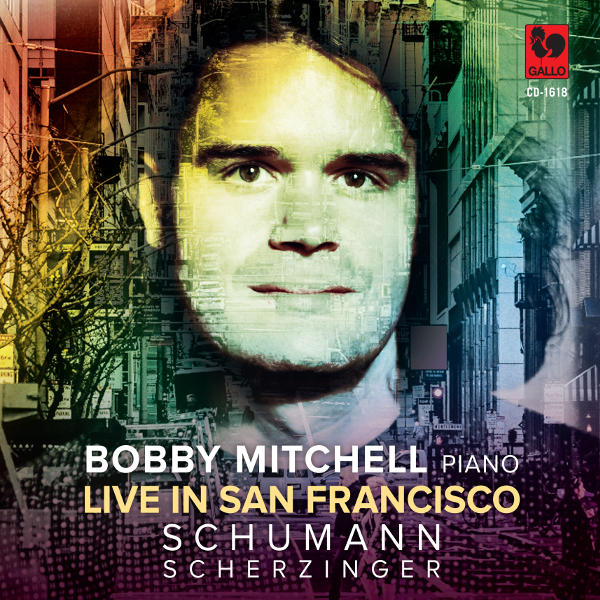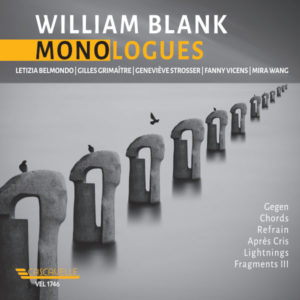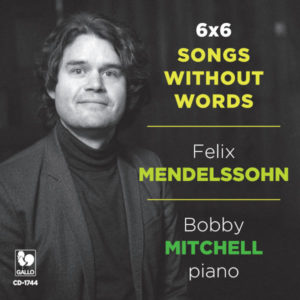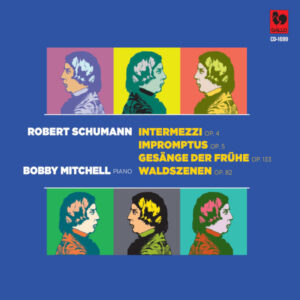Extraits / Excerpts
SCHUMANN : KINDERSZENEN, OP. 15 – FANTASY, OP. 17 – FOUR FUGUES, OP. 72 – ARABESQUE, OP. 18 – SCHERZINGER : PIANO ETUDES – BOBBY MITCHELL, PIANO (LIVE)
Robert SCHUMANN : Kinderszenen, Op. 15 – Fantasy in C Major, Op. 17 – Four Fugues, Op. 72 – Arabesque, Op. 18 – Martin SCHERZINGER : Piano Étude No. 1 “fast zu sorglos” – Piano Étude No. 2 “The Horse is Not Mine, An Imitation Horse” – Piano Étude No. 5.
Bobby Mitchell, Piano.
https://www.bobbymitchellpiano.com/
While playing Schumann’s music in concert, a multitude of powers take over and guide the performance. The piano-playing summons otherworldly natural forces and lets these conjure their spells. In a particular performance, they collaborate in unforeseen ways that are unique to that moment – it will be different the next time around. In a sense, this kind of witchcraft takes place during every live performance, but I believe that Schumann’s music is an especially potent platform for relinquishing control to these powers.
Behind his carefully notated scores lies an inner world of tense psychological suspense. The unpredictable ways in which different humors (joy, or despair, sorrow, or elation) co-mingled in Schumann’s mind captivated but certainly also bewildered him. He even took measures to catalog his inner world by naming certain attributes, thus personifying them. Florestan and Eusebius are often understood as imaginary “people,” but could also be understood as opposing forces, interacting in much the same way as yin and yang do. Schumann’s inner world was not exceptional as a phenomenon – every human has one, different than Schumann’s but equally unique and complex. The exceptional thing was how Schumann created access for us to his through music notation, a collection of symbols that can transmit so much meaning.
In Schumann’s scores I see an undercurrent of unbearable tension. It is visible almost everywhere. It’s like a geyser that doesn’t ever quite trigger but leaks gas constantly, and now and then a series of bubbles or the occasional spew of boiling water. Although the poet speaks so calmly and wisely (at the end of Kinderszenen), short spurts of black ink disrupt the page and expose an anxious and uncertain undertone. Schumann’s Träumerei is not just anybody’s daydream – the micro-canonic entries of the opening gesture expose an underlying restlessness that cannot be repressed, even during innocent and aimless contemplation. Martin Scherzinger’s creative extrapolations of Schumann’s score-content, in the form of piano études, stand in sunny relief to Schumann’s depictions of childhood. Childish in their own outgoing, rhythmic way, Scherzinger’s music influenced the way I can see and then sonify layers in Schumann’s music. The first page of the Fantasy overflows with natural energy, a river of boiling water rapidly flowing underneath an outcry of melodic passion. I hear this melody as a setting of Schlegel’s text with which Schumann prefaces the music:
Durch alle Töne tönet
im bunten Erdentraum
ein leiser Ton gezogen
für den der heimlich lauschet
In an attempt to translate these lines, I think of something like a quiet resonance within the world that resounds for you, the listener listening in secret.
This recording contains live performances from 2016 and 2019 at the Old First Methodist Church in downtown San Francisco.
Bobby Mitchell, 2020
- Categories
- Composers
- Interprets
- Booklet












